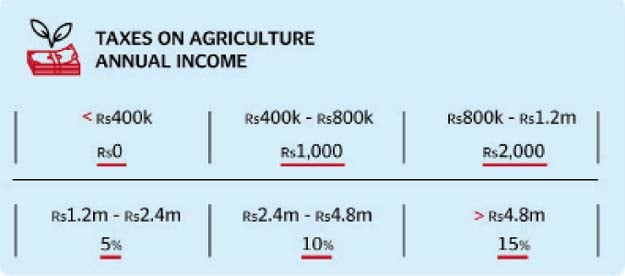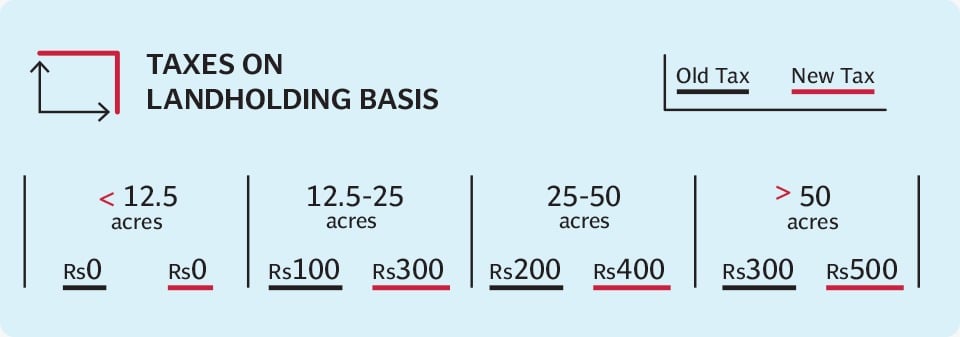ISLAMABAD:
The richest landlord in Punjab pays 85% less income tax compared to the highest paid salaried person due to a year-old decision of the Pakistan Tehreek-e-Insaf (PTI) provincial government, when it adopted low agricultural income tax rates.
The difference between tax rates for a landlord and a businessman widens up to 150%, showed the comparison of income tax rates being charged to the landlord, on business income and salaried income.
Since July 2019, the Punjab government has been collecting abysmally low taxes on agricultural income, particularly from big landholders, who pay just Rs500 per acre or 15%, whichever is higher.
The income tax rates were lowered a year ago amid losses of over Rs88 billion per annum that Pakistan sustains due to a fragmented agricultural income tax regime.
Under the 1973 Constitution, agricultural income is a provincial subject - a decision that has proved very costly as even Pakistan’s top industrialists have been declaring their business income as agricultural income to avoid taxes.
For agricultural income tax collection, the Punjab government has adopted lax tax slabs since July 2019, which the previous Pakistan Muslim League-Nawaz (PML-N) government introduced towards the end of its tenure, but were struck down by the federal PTI government in September 2018.
The provincial government adopted these low rates in July last year - nine months after the federal government abandoned these. Former finance minister Asad Umar had termed the PML-N’s income tax slabs a “political stunt” ahead of July 2018 elections.
After the adoption of these tax rates by PTI’s Punjab government, Pakistan’s biggest landholder either pays Rs500 per acre or a maximum 15% against the 35% tax that a salaried person pays on his gross income. The revision in tax rates has benefited Pakistan’s biggest landholders, some of whom are sitting federal and provincial ministers and others are members of national and provincial assemblies.
Now, a salaried person earning up to Rs1 million annually pays 900% higher income tax than a landholder in Punjab having similar earnings, showed the comparison of effective average income tax rates being applied to landlords and salaried persons.
In the highest slab, the richest landlord pays 85% less income tax as compared to a salaried person. The effective average rate for the richest landlord is 12.3% while the salaried person pays on average 22.7% tax after adjusting exemption thresholds.
In the outgoing fiscal year, the federal government, all provincial governments and local governments have waived Rs18.9 billion in agricultural income tax, according to the tax expenditure statement of the Federal Board of Revenue (FBR).
“It is estimated that Rs69.5 billion is the tax gap on account of provinces having the mandate to levy tax on agricultural income,” said the FBR.
The combined income tax collection by all the four provinces is less than Rs2 billion per annum.
The PTI government in Punjab introduced amendments to the Punjab Agricultural Income Tax Act 1997 in July last year, which not only further reduced tax burden on the biggest landlords but also made changes to the federal Income Tax Ordinance redundant that had been introduced to check tax avoidance by the landlords and industrialists.
The provincial government increased income tax on a landholding basis but massively reduced the tax on total agricultural income. Under the provincial law, the agriculturist pays tax on the basis of the highest two rates, either on a landholding or total income base.
According to the revised rates, if the landholding does not exceed 12.5 acres, there is no tax. In case of land exceeding the minimum threshold but does not exceed 25 acres, the tax rate is only Rs300 per acre, up from the previous Rs100.
For 26 to 50 acres, the tax rate is Rs400 per acre, higher from Rs20 per acre and for landholdings above 50 acres, the rate is Rs500 per acre, higher from the previous rate of Rs300 per acre.
However, the benefit was given to the big landlords by lowering the total income-based agricultural tax. In September 2013, the PML-N’s provincial government introduced Section 3B in the 1997 Act to enhance agricultural income tax collection.

Minister’s stance
“The government significantly increased the landholding-based income tax rates in the last budget, which is also the main contributor to the agricultural income tax,” said Punjab Finance Minister Hashim Jawan Bakht.
He said due to fragmented landholding, 97.5% of landholding is less than 12.5 acres.
This year, the government did not change the agricultural income tax rates due to locust attack and food security issues, said the Punjab finance minister while responding to a question about keeping the low tax rates unchanged in the budget.
He said the provincial government would consider increasing the rates in the next budget.
Tax exemption
PTI’s provincial government drastically reduced these rates. Earlier, there was no income tax exemption limit, which the provincial government set at Rs400,000 from July last year.
Earlier, on Rs100,000 worth of agricultural income, the tax rate was 5%, for up to Rs200,000 the rate was 7.5%, for up to Rs300,000 the rate was 10% and above Rs300,000 the rate was 15%.
Now, where the total annual income does not exceed Rs400,000, the tax is zero. Where the total income exceeds Rs400,000 but does not exceed Rs800,000, the tax rate is Rs1,000 and where the total income exceeds Rs800,000 but does not exceed Rs1.2 million, the rate is Rs2,000.
As per the applicable rates, where the total net income exceeds Rs1.2 million but does not exceed Rs2.4 million, the income tax rate is 5%, where the total income exceeds Rs2.4 million but does not exceed Rs4.8 million, the rate is 10% and where the total net income exceeds Rs4.8 million, the rate is 15%.

Benefits
As per old rates, if the annual income was up to Rs1 million, the average tax rate was 12.8%, which has now been lowered to 0.2%. But the effective income tax for the salaried class on income of Rs1 million is 2%.
An agriculturist in Punjab was subject to 13.9% tax on income of Rs2 million, which has been cut to 2%. Compared to this, a salaried person is paying 6% effective income tax on this threshold that is 200% higher.
On the income of Rs3 million, earlier the average rate was 14.3% that has been cut to 4% for agriculturists in Punjab. A salaried person pays 9.4% income tax, which is 135% higher than the agricultural income tax.
On annual income of Rs5 million, the rate was 14.6% that has been cut to 4.2% for landlords in Punjab but a salaried person is paying 13.4% tax, higher by 219%.
For income of up to Rs7.5 million, the old average income tax rate was 14.7%, which has been cut to 7.8% for landlords. In this category, salaried persons are paying 16.4% income tax, higher by 110%.
On income of up to Rs10 million, the old rate was 14.8% that has been cut to 9.6% for landlords. But the salaried person pays 18.4% income tax, which is higher by 92%.
On income of up to Rs15 million, the old rate was 14.9% that has been cut to 11.4% for landlords but a salaried person pays 21% income tax, higher by 87%.
On annual income of up to Rs20 million, the old average rate was 14.9% that has been cut to average 12.3%. For a salaried person, the effective income tax rate is 22.7%, higher by about 85%.
“The constitutional spirit is that the federal and provincial income tax rates should be same, irrespective of the source of income,” said Dr Ikramul Haq, a lawyer of the Supreme Court of Pakistan and a leading tax adviser.
He said the Punjab government should have adopted new income tax rates enforced by the PTI government after September 2018.
“Agricultural income tax rates were reduced in 2019 to give benefit to big landlords and there is a need to introduce a new column in the Tax Directory to know how much Pakistan’s landlords pay in agricultural income tax,” said Haq.
Published in The Express Tribune, June 26th, 2020.
Like Business on Facebook,
follow @TribuneBiz on Twitter to stay informed and join in the conversation.






















COMMENTS
Comments are moderated and generally will be posted if they are on-topic and not abusive.
For more information, please see our Comments FAQ